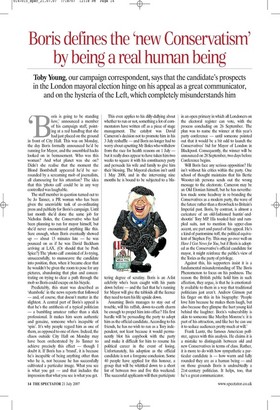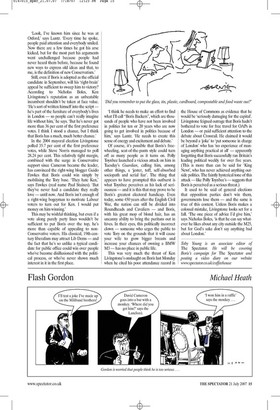Boris defines the 'new Conservatism' by being a real human being
Toby Young, our campaign correspondent, says that the candidate's prospects in the London mayoral election hinge on his appeal as a great communicator, and on the hysteria of the Left, which completely misunderstands him ‘ oris is going to be standing here,' announced a member B of his campaign staff, pointing at a red handbag that she had just placed on the ground in front of City Hall. This was on Monday, the day Boris formally announced he'd be running for Mayor, and the assembled hacks looked on in bemusement. Who was this woman? And what planet was she on? Didn't she realise that the moment the Blond Bombshell appeared he'd be surrounded by a screaming mob of journalists, all clamouring for his attention? The idea that this 'photo call' could be in any way controlled was laughable.
The staff member in question turned out to be Jo Tanner, a PR woman who has been given the unenviable task of co-ordinating press and publicity for Boris's campaign. Until last month she'd done the same job for Nicholas Boles, the Conservative who had been planning to run for mayor himself, but she'd never encountered anything like this. Sure enough, when Boris eventually showed up — about 15 minutes late — he was pounced on as if he was David Beckham arriving at LAX. (Or should that be Posh Spice?) The 'photo call' consisted of Jo trying, unsuccessfully, to manoeuvre the candidate into position, then, when it became clear that he wouldn't be given the room to pose for any pictures, abandoning that plan and concentrating on trying to clear a path through the mob so Boris could escape on his bicycle.
Predictably, this stunt was described as `shambolic' in the news reports that followed — and, of course, that doesn't matter in the slightest. A central part of Boris's appeal is that he's the antithesis of a typical politician — a bumbling amateur rather than a slick professional. It makes him seem authentic and genuine, someone who's incapable of 'spin'. It's why people regard him as one of them, as opposed to one of them. Indeed, the chaos outside City Hall on Monday may have been orchestrated by Jo Tanner to achieve precisely this effect — though I doubt it. If Boris has a 'brand', it is because he's incapable of being anything other than who he is, not because he has successfully cultivated a particular image. What you see is what you get — and that includes the impression that what you see is what you get.
This even applies to his dilly-dallying about whether to run or not, something a lot of commentators have written off as a piece of stage management. The catalyst was David Cameron's decision not to promote him in his 3 July reshuffle — and Boris no longer had to worry about upsetting Mr Boles who withdrew from the race for health reasons on 1 July — but it really does appear to have taken him two weeks to square it with his constituency party and persuade his wife and family to give him their blessing. The Mayoral election isn't until 1 May 2008, and in the intervening nine months he is bound to be subjected to a blistering degree of scrutiny. Boris is an A-list celebrity who's been caught with his pants down before — and the fact that he's running for Mayor will give the tabloids all the licence they need to turn his life upside down.
Assuming Boris manages to stay out of trouble, will his raffish, down-to-earth charm be enough to propel him into office? His first hurdle will be persuading the party to adopt him as the official candidate. According to his friends, he has no wish to run as a Tory independent, not least because it would permanently blot his copybook with the party and make it difficult for him to resume his political career in the event of losing. Unfortunately, his adoption as the official candidate is not a foregone conclusion. Some 40 people have applied for this honour, a group that will be whittled down to a short list of between two and five this weekend. The successful applicants will then participate in an open primary in which all Londoners on the electoral register can vote, with the process concluding on 26 September. The plan was to name the winner at this year's party conference — until someone pointed out that it would be a bit odd to launch the Conservatives' bid for Mayor of London in Blackpool. Consequently, the winner will be announced on 28 September, two days before Conference begins.
Will Boris face any serious opposition? He isn't without his critics within the party. One school of thought maintains that his Bertie Wooster-ish persona sends out the wrong message to the electorate. Cameron may be an Old Etonian himself, but he has nevertheless made some headway in re-branding the Conservatives as a modem party, the wave of the future rather than a throwback to Britain's Imperial past. Boris, by contrast, is almost a caricature of an old-fashioned huntin'-andshootin' Tory MP His tousled hair and rumpled suits, not to mention his upper-class accent, are part and parcel of his appeal. He's a kind of pantomime toff, the political equivalent of Stephen Fry. This may go over well on Have I Got News for You, but if Boris is adopted as the Conservative's official candidate for mayor, it might reinforce the public's view of the Tories as the party of privilege.
Against this, his supporters insist it is a fundamental misunderstanding of The Boris Phenomenon to focus on his poshness. The reason the British public hold him in such affection, they argue, is that he is emotionally available to them in a way that traditional politicians just aren't. Andrew Gimson put his finger on this in his biography: 'People love him because he makes them laugh, but also because they glimpse the hurt young kid behind the laughter. Boris's vulnerability is akin to someone like Marilyn Monroe's: it is part of his attraction, and like her he can use it to seduce audiences pretty much at will.'
Frank Luntz, the famous American pollster, agrees with this analysis. He claims it is a mistake to distinguish between old and new Conservatives in terms of class. Rather, it is more to do with how sympathetic a particular candidate is — how warm and fully rounded they are as a human being — and on those grounds Boris is undoubtedly a 21st-century politician. It helps, too, that he's a great communicator.
'Look, I've known him since he was at Oxford,' says Luntz. 'Every time he spoke, people paid attention and everybody smiled. Now there are a few times he got his arse kicked, but for the most part his arguments went unchallenged because people had never heard them before, because he found new ways to express old ideas and that, to me, is the definition of new Conservatism.'
Still, even if Boris is adopted as the official candidate in September, will his 'right-brain' appeal be sufficient to sweep him to victory? According to Nicholas Boles, Ken Livingstone's reputation as an unbeatable incumbent shouldn't be taken at face value. 'He's sort of written himself into the script — he's part of the furniture of everybody's lives in London — so people can't really imagine life without him,' he says. 'But he's never got more than 36 per cent of the first preference votes. I think I stood a chance, but I think that Boris has a much, much better chance.'
In the 2004 mayoral election Livingstone polled 35.7 per cent of the first preference votes, while Steve Norris managed to poll 28.24 per cent. This relatively tight margin, combined with the surge in Conservative support since Cameron became the leader, has convinced the right-wing blogger Guido Fawkes that Boris could win simply by mobilising the Tory base. 'They hate Ken,' says Fawkes (real name Paul Staines). 'But they've never had a candidate they really love — until now. And Boris isn't enough of a right-wing bogeyman to motivate Labour voters to turn out for Ken. I would put money on him winning.'
This may be wishful thinking, but even if a vote along purely party lines wouldn't be sufficient to put Boris over the top, he's more than capable of appealing to nonConservative voters. His classical, 19th-century liberalism may attract Lib Dems — and the fact that he's so unlike a typical candidate for public office could win over people who've become disillusioned with the political process, or who've never shown much interest in it in the first place.
'I think he needs to make an effort to find what I'll call "Boris Backers", which are thousands of people who have not been involved in politics for ten or 20 years who are now going to get involved in politics because of him,' says Luntz. 'He needs to create this sense of energy and excitement and debate.'
Of course, it's possible that Boris's freewheeling, seat-of-the-pants style could turn off as many people as it turns on. Polly Toynbee launched a vicious attack on him in Tuesday's Guardian, calling him, among other things, a 'jester, toff, self-absorbed sociopath and serial liar'. The thing that appears to have prompted this outburst is what Toynbee perceives as his lack of seriousness — and it is this that may prove to be Boris's greatest electoral handicap. Even today, some 450 years after the English Civil War, the nation can still be divided into Roundheads and Cavaliers — and Boris, with his great mop of blond hair, has an uncanny ability to bring the puritans out in hives. In their eyes, this politically incorrect clown — someone who urges the public to vote Tory on the grounds that it will cause your wife to grow bigger breasts and increase your chances of owning a BMW M3 — has no place in public life.
This was very much the thrust of Ken Livingstone's onslaught on Boris last Monday when he cited his poor attendance record in the House of Commons as evidence that he would be 'seriously damaging for the capital'. Livingstone feigned outrage that Boris hadn't bothered to vote for free travel for OAPs in London — or paid sufficient attention to the debate about Crossrail. He claimed it would be beyond a 'joke' to 'put someone in charge of London' who has 'no experience of managing anything practical at all' — apparently forgetting that Boris successfully ran Britain's leading political weekly for over five years. (This is more than can be said for 'King Newt', who has never achieved anything outside politics. The faintly hysterical tone of this attack — like Polly Toynbee's — suggests that Boris is perceived as a serious threat.) It used to be said of general elections that opposition parties don't win them, governments lose them — and the same is true of this contest. Unless Boris makes a colossal mistake, Livingstone looks set for a fall. 'The one piece of advice I'd give him,' says Nicholas Boles, 'is that he can say whatever he likes about any city outside the M25, but for God's sake don't say anything bad about London.'
Toby Young is an associate editor of The Spectator. He will be covering Boris's campaign for The Spectator and posting a video diary on our webs ite www.spectator.co.uktcoffeehouse













































 Previous page
Previous page